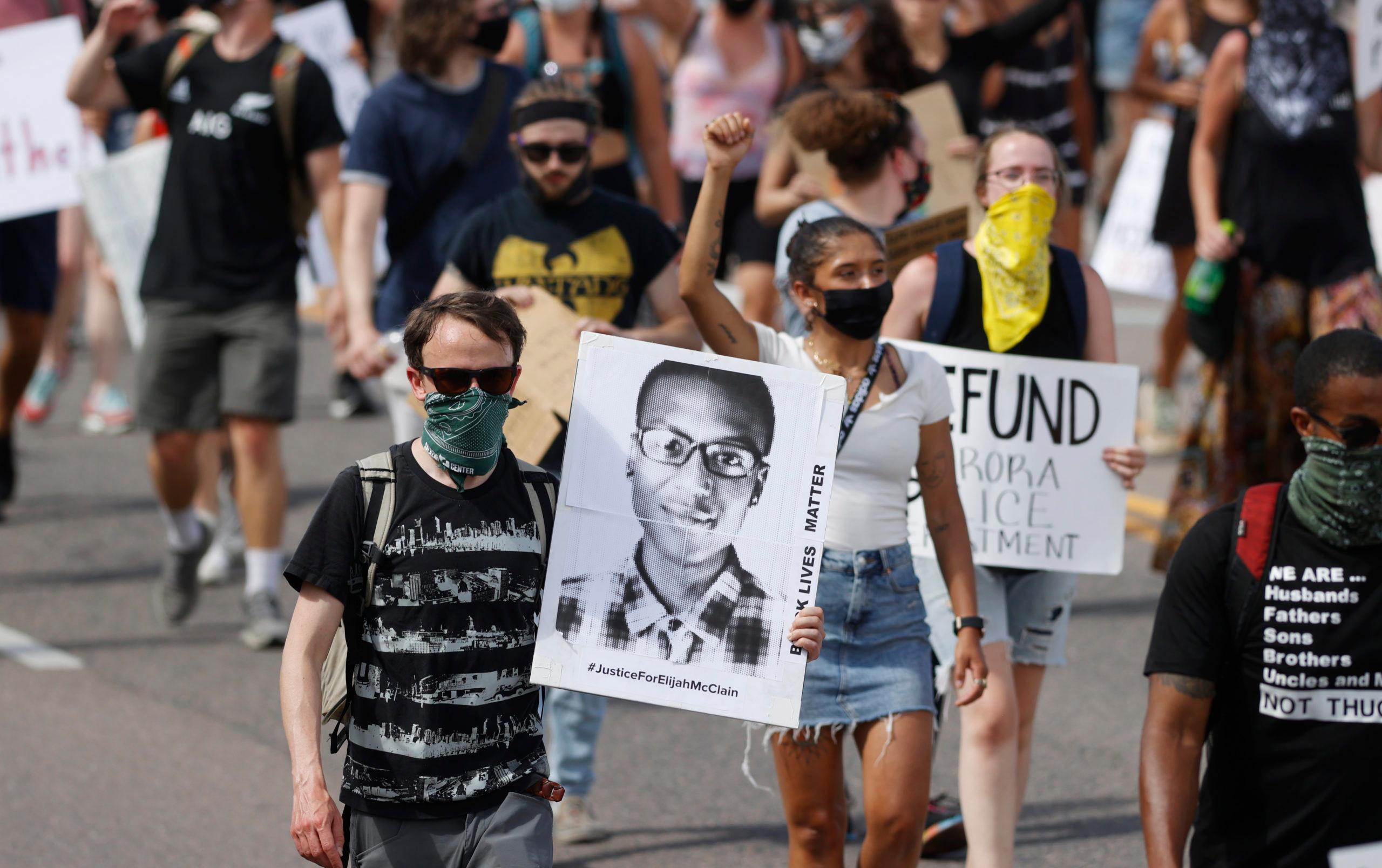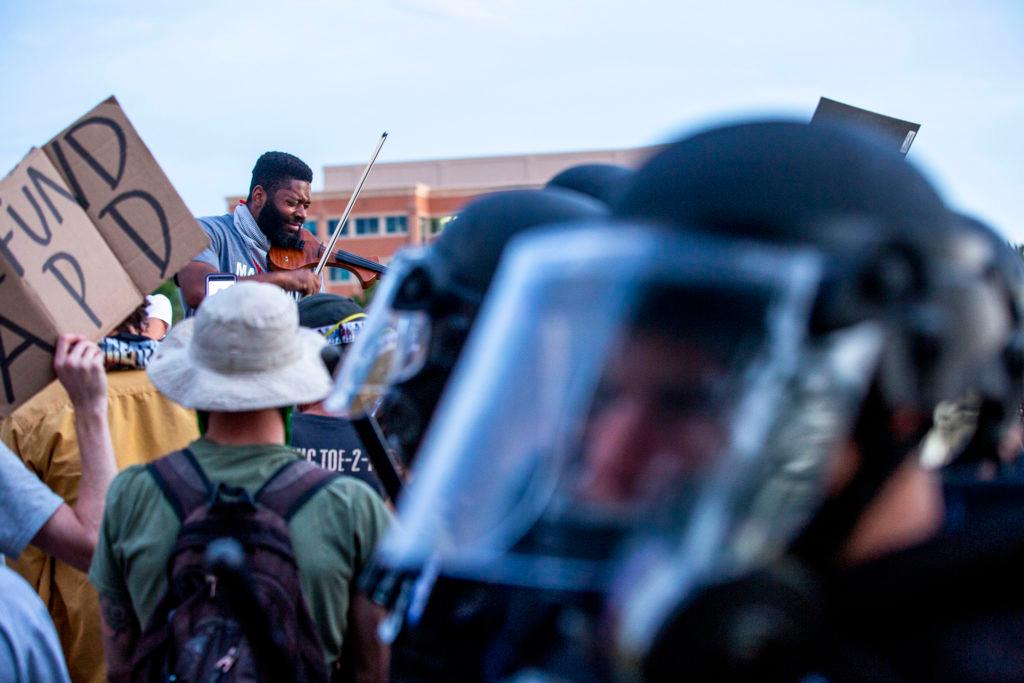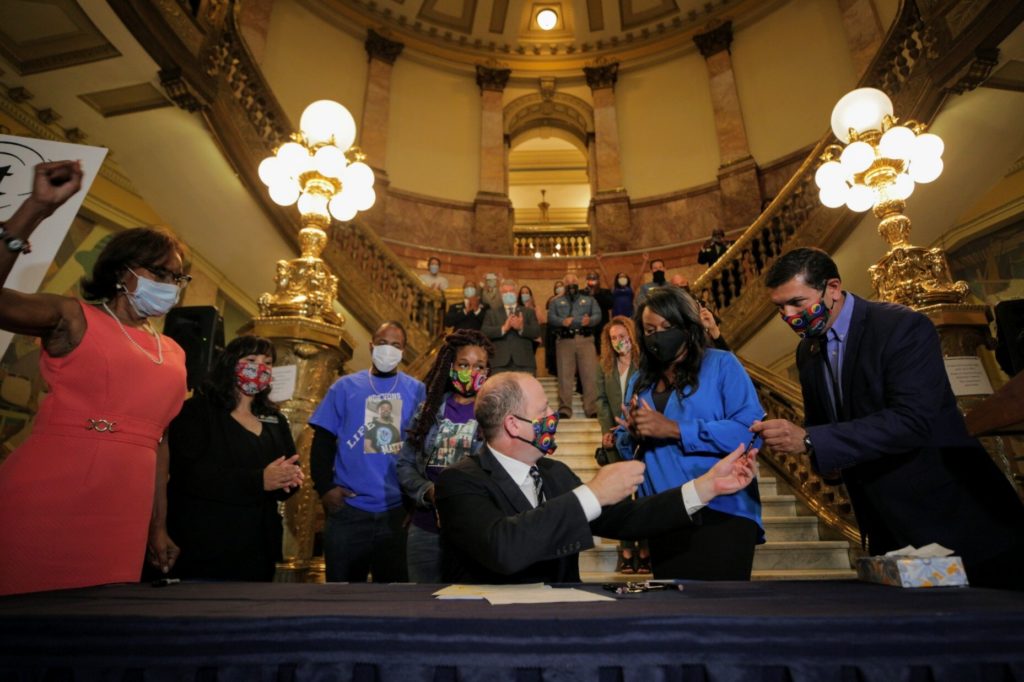
The pathologist who performed the autopsy of Elijah McClain told the Adams County coroner that the manner of death “may be undetermined” — rather than a homicide — before he had reviewed complete police reports, witness statements or video capturing a violent confrontation between Aurora Police and McClain.
Dr. Stephen Cina’s final decision, that McClain’s manner of death could not be determined, came after Adams County Coroner Monica Broncucia-Jordan met with Aurora police officers investigating McClain’s death, according to emails obtained by CPR News through an open records request.
In addition to meeting with the coroner in the midst of the investigation, Aurora police investigators were also present at the autopsy — even as the actions of some of the department’s officers were under review.
Allowing officers from the agency at the center of a death case to be present during the autopsy — and to consult with the coroner leading it — while the case is under investigation “should not happen,” said Democratic state Rep. Leslie Herod, author of the law enforcement reform legislation that passed in Colorado this year.
And failing to seek a second medical opinion to avoid an undetermined ruling in an autopsy is not a best practice, according to the head of a national coroners group.
McClain died in August 2019, a few days after Aurora police attempted to detain him while investigating a complaint about a suspicious person. Officers placed him in two carotid chokeholds and pinned him to the ground for nearly 18 minutes, according to his family’s attorney. McClain vomited and fainted. Paramedics, who arrived on scene after McClain was in custody, injected him with 500 mg of the sedative ketamine, which is the recommended dosage for a 200-pound person. McClain weighed 143 pounds.
The 23-year-old went into cardiac arrest in the ambulance and never recovered. He was declared dead on Aug. 27 at 3:51 p.m., three days after the encounter with Aurora officers.
Seven days later, on Sept. 3, Cina conducted the autopsy with two Aurora police officers and two representatives from the Adams County District Attorney’s Office in attendance. The coroner would neither disclose to CPR the names of those who watched nor release transcripts of any comments made during the autopsy.
Twenty-eight days after the autopsy was completed, on Oct. 1, Cina, an independent contractor who is paid at least $324,000 annually to perform 324 autopsies a year in Adams County, wrote an email to Broncucia-Jordan:
“still need witness statements, police report, and any video of the incident. I know APD doesn’t like long narrative on homicides, but it appears appropriate here. may be undetermined.”
The subject line of that email was “draft for review.” The file attached, of an apparent draft of the autopsy report, was not provided to CPR News. Cina’s contract requires him to provide early results of autopsies to the coroner before finalizing his decisions.
Fifteen days later, on Oct. 16, Coroner Broncucia-Jordan met with Aurora detectives. Those involved in that meeting have either declined to comment on what was discussed or have declined to respond to questions from CPR News.
The day after that meeting, Cina sent another email to Broncucia-Jordan, with the attachment “McClain, E Autopsy.” His final report, dated Nov. 7, declared there was no way to determine whether police or paramedics played a role in his death, effectively crippling any effort to find criminal fault with the response to the initial call of a “suspicious person.”
McClain had committed no crime.
Before Cina signed that final report, he had received copies of the Aurora police reports on their encounter with McClain and video from the incident. None of it altered his apparent initial intuition to rule the manner of death as undetermined.
At the time, though there had been local coverage of McClain’s death, and his family had been vocal in insisting on a complete investigation, there was no way for Cina to know that what happened to the young musician would, over the next year, become a subject of global protests and petitions.

In Colorado, manners of death are classified as homicides, suicides, accidents or natural causes.
A homicide finding simply means that one human being caused the death of another — it imparts no criminal liability. It is up to district attorneys or grand juries to decide whether a homicide merits a criminal charge. Then juries decide guilt or innocence.
It’s rare in Colorado to have both an undetermined manner and cause of death. In 2019, only 53 deaths out of 40,100 had both an undetermined cause and manner, according to the Colorado Department of Public Health and the Environment.
In the McClain case, Dr. Cina’s inability to determine either the manner or cause of his death put Dave Young, the district attorney for the 17th Judicial District, which includes Adams County, in a tough spot as he considered whether the Aurora officers’ conduct was lawful. Two weeks after Cina signed and dated the autopsy report, Young ruled that he could not charge the officers.
“There is no evidence that any of the officers sought to cause injury or death to Mr. McClain,” Young wrote in his Nov. 22 decision letter clearing the officers who arrested McClain. “The results of the forensic autopsy demonstrate that the cause of Mr. McClain’s death was undetermined. Therefore, the evidence does not support a conclusion that Mr. McClain’s death was the direct result of any particular action of any particular individual … Consequently, the evidence does not support the prosecution of a homicide.”
Neither Coroner Broncucia-Jordan, who is not a doctor, nor DA Young sought a second opinion, which the president of the National Association of Medical Examiners seeks in her own office for “undetermined” death cases. And the coroner didn’t seek an inquest, a process allowed under state law where a panel of six citizens is convened to hear testimony and weigh facts in determining a cause of death.
Broncucia-Jordan declined an interview for the story and declined to answer questions about McClain’s autopsy, citing pending investigations. But she said in a written statement that it is “routine” for representatives from the DA’s office, the police and sometimes public defenders to attend autopsies of “all criminal and potential criminal cases.”
“If my office did not interact with the agency responsible for investigating the criminal aspect of a death, how do you suppose my office would obtain information on a scene which we do not have the opportunity to investigate ourselves?” Broncucia-Jordan said in the emailed statement. “In police-involved deaths, my office has to interact with the involved law enforcement agency, or the agency investigating the involved law enforcement agency, in order to learn what transpired at the scene, in order to obtain witness statements, and in order to obtain any existing video surveillance.”
Dr. Cina did not respond to multiple requests for comment from CPR News or to a list of detailed questions about the sequence of events during his handling of the case. Aurora Police also did not respond to multiple requests for comment about their relationship with the coroner’s office on death investigations.
A representative from Mayor Mike Coffman’s office did not respond to CPR News’ questions about the autopsy investigation. DA Young did not comment on why he didn’t ask for a second opinion on the autopsy.
Democratic state Rep. Mike Weissman, who represents east Aurora, said the legislature should address gaps in state law that allow cops and coroners to work together in death investigations where police or paramedics may be responsible.
“I think it’s important for the public to have confidence in the finding of a cause of death investigation of anyone in Colorado where police or first responders may have been involved,” Weissman said. “For the sake of transparency and police community trust, it would be appropriate for the legislature to look at that.”
In his final autopsy report on the death of McClain, Dr. Cina said both the manner and cause of death may be “natural” if McClain had an “undiagnosed mental illness” that led to “excited delirium” — a diagnosis cited often by law enforcement in cases where someone may have been using drugs.
McClain had a small amount of THC in his blood, but no evidence of any other drugs — including stimulants, which can cause excited delirium. Cina said McClain’s death could have been caused by “intense physical exertion,” which would have been dangerous given that McClain had a narrow coronary artery, according to the report. Or, Cina wrote, McClain’s death could have been a homicide if “the actions of the officers” caused his death.
“I cannot determine whether a carotid control hold contributed to the death … The decedent was violently struggling with officers who were attempting to restrain him,” Cina wrote. “Most likely the decedent’s physical exertion contributed to death. It is unclear if the officers’ actions contributed as well. It is also unclear whether the decedent aspirated vomit while restrained.”
McClain’s family lawyer, Mari Newman, recently filed a federal lawsuit against the city of Aurora and more than a dozen officers and paramedics who handled McClain the night of Aug. 24. She said when police and prosecutors are in the room during an autopsy, it strips the coroner of any appearance of independence.
“Of course it influences the outcome, and of course that is designed to make sure that the coroner and the pathologist find that the killer did nothing wrong,” Newman said. “These officers who attacked Elijah McClain … the medics who injected the ketamine … obviously committed a homicide, the killing of another person. The fact that members of the Aurora Police Department were there watching was designed to make sure that there was no finding that they did that.”
Herod, who led the bipartisan effort at the state legislature earlier this summer to pass the police accountability law, called collaborations between coroners and law enforcement agencies during death investigations when cops were involved “unethical.”
“We need to put laws into place to ensure that when an officer is involved in the death of a citizen that the coroner does not have that department involved in a conversation about the report of that person’s death,” she said. “We need to look at the relationship between coroners offices and law enforcement agencies. They should not be involved in the report or in the room when the coroner is investigating the death of someone who died at the hands of law enforcement. That should not happen.”
The freshly passed police accountability law is supposed to put guardrails around when law enforcement officers in Colorado use deadly force — including carotid chokeholds, which have since been banned in Aurora — during detention or arrests.
The law prohibits deadly force in any arrest when the person is suspected of a non-violent offense and allows officers to use deadly force only when they fear for their own lives or other lives. The new law also requires officers to announce in most circumstances when they’re about to use deadly force against someone.

The day before Cina’s autopsy report was sent to the coroner, Broncucia-Jordan and Aurora Police detectives Matt Ingui and Stephen Jokerst had a meeting at the coroner’s office.
“Thank you for the update! Have a nice weekend and I’ll await the dates for our meeting,” Ingui wrote to the coroner and other staffers in early October 2019. “I appreciate you (sic) assistance greatly.”
Sherronda Appleberry, chief deputy coroner, responded, “I will be out of the office next week so I’ve included Monica (Broncucia-Jordan) on this email. She will give you some dates on the meeting you requested. We can also discuss the ketamine at that meeting.”
Details about what was discussed at that meeting, including notes from it, were not disclosed to CPR News. Adams County assistant attorney Meredith Van Horn cited an active criminal investigation in denying the records.
There are currently five government investigations into the Aurora Police Department and McClain’s death, all of them sparked by national uproar over police tactics following the death of George Floyd in Minneapolis.
Law enforcement officers and coroners work together nearly every day in metro Denver. Coroners and their investigators get access to crime scenes and have to consult with police and sheriffs deputies regularly to reach conclusions about how people died.
But coroners are also the first objective reviewers of a death case with no stake in the outcome, making it important that they function independently from police, said Dr. Sally Aiken, head of the National Association of Medical Examiners, or NAME.
“Coroners and medical examiners ideally work independently of law enforcement and even prosecutors. We are providing the information and seeking the truth,” Aiken said. “It is an independent investigation.”
From her office in Spokane County, Washington, Aiken said she always sends “undetermined” manner and cause of death cases to another expert for a second opinion.
“We make sure that the first pathologist considered everything they should have considered, that they didn’t miss something,” she said. “It’s never unusual in forensic medicine to ask for a second opinion.”








